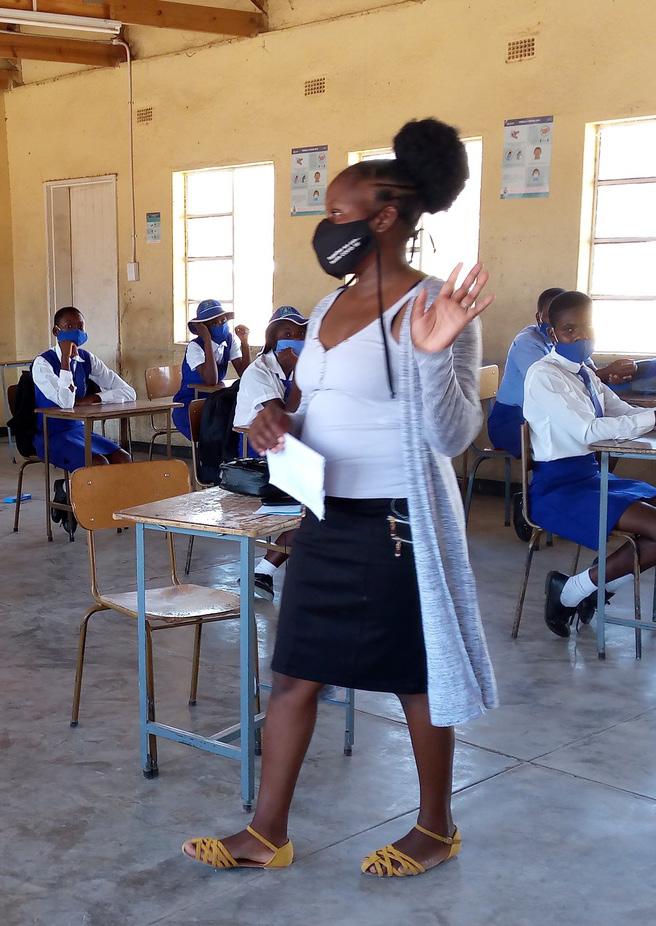
3 minute read
How did the CAMFED projects adapt during COVID-19?
The impact of the COVID-19 pandemic affected households, income and girls’ ability to learn, however learning and transition results demonstrate the project was effective in mitigating the impact of the pandemic on some of the country’s most vulnerable learners and young women.
School disruption due to the COVID-19 pandemic continued till 2021, in most of the countries the two projects were in operating in. The most severe disruptions were in Zimbabwe, where school opening was delayed for several months at the beginning of the year due to another lockdown. Countries changed their school calendars, prioritised exam classes, and postponed openings in response to the continuing crisis.
In all three countries, Learner Guides and Teacher Mentors continued to engage learners even during school closures. In Zambia, Learner Guides and Teacher Mentors supported learners with learning circles and help desks. In Zimbabwe, 92% of examination re-sit learners were reached with support by Learner Guides while they were out of school. Learner Guides demonstrated their true value during the pandemic through their deep integration within communities. The young women were able to adapt their activities quickly and effectively in response to locally identified need and opportunities. CAMFED continued to work with schools, communities and government ministries, supported by the activism of the young women in the CAMFED Association, to reach out to vulnerable children, help students to catch up in the lead-up to their exams, and prevent girls from permanently dropping out of school.
My Better World radio broadcasts significantly extended the reach of the life skills curriculum to families and communities with whom its messages on child protection, resilience and adaptation resonated. Young women from the CAMFED Association also engaged closely and effectively with local and traditional leaders, building awareness of COVID-19 risks and mitigation and drawing on their authority to encourage attendance at community-based study groups.
Below are just a few examples of their work to mitigate the effect of school closures in each of the countries.
• CAMFED Tanzania which experienced the shortest school closures of all the countries of operation, and none in 2021, worked with schools to enable them to provide extra or extended lessons for children and supported students to attend these lessons. CAMFED also helped by collating appropriate learning materials, e.g. by printing past exam papers, while Learner Guides continued to deliver life skills and wellbeing sessions via local radio in collaboration with the government.
• CAMFED Zambia launched a Back-to-School campaign and collaborated with leading EdTech company and global teacher community Tes to create accelerated curriculum learning resources and train teachers in partner schools to be better able to support students to catch up on lost learning. CAMFED worked with partners to provide financial support to the most vulnerable families to ensure girls would not drop out of school permanently, while also investing to improve school facilities, implement school meal programmes, and distribute self-study kits for home learning.
From May 2021, CAMFED Zambia began distributing 2,620 solar radios to support distance learning in partnership with UNICEF and the Ministry of Education. CAMFED Association members continued to participate in radio broadcasts focused on children’s rights and welfare, introducing wider audiences to CAMFED’s My Better World life skills and wellbeing curriculum. The CAMFED presenters led discussions on topics such as child protection and the importance of girls’ education.
While learning assessments were not completed at end line due to travel restrictions and safety concerns associated with the COVID-19 pandemic, exam pass rates among supported learners in Tanzania and Zambia were in line with those among CAMFED supported learners the previous year and only slightly below the national average – and in peri-urban districts above the national average – indicating that the programme helped to mitigate the impact of the pandemic among some of the countries’ most vulnerable learners. COVID-19 can also be seen to have had a significant impact on in-school transition: in-school transition rates declined in comparison schools across both projects, however CAMFED’s programme mitigated the impact for GEC-T schools, resulting in a less severe decrease in transition rates within The Virtuous Cycle of Girls’ Education schools, and reversing the trend in Girls Learn, Succeed and Lead schools.
• CAMFED Zimbabwe provided thousands of learning materials, including My Better World workbooks and Maths study guides, to support learning during lockdowns. To help schools to reopen safely in March, they distributed two thermometers and 20 litres of liquid soap to each of 1,083 partner secondary schools, to ensure they could comply with COVID-19 protocols. 497 of the least wellresourced schools were supported with reopening kits comprising stationery, teaching materials, and textbooks.
Learner Guides were at the forefront of supporting delivery of learning during lockdowns and school closures through study groups and online platforms. The value of these young women, who are embedded in their communities, was demonstrated once again when there was need to pivot between school and community support for students – particularly during periods of schools adopting rotational attendance in order to deliver an accelerated curricula. They worked with girls retaking their exams by facilitating Maths and English revision, for example, collaborating with subject teachers to offer support and plug any gaps identified together.




